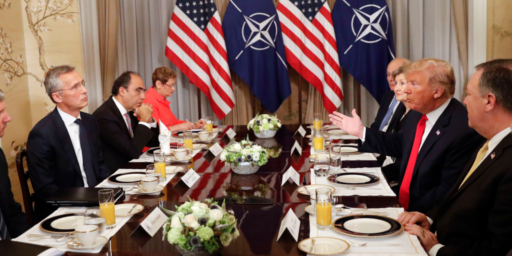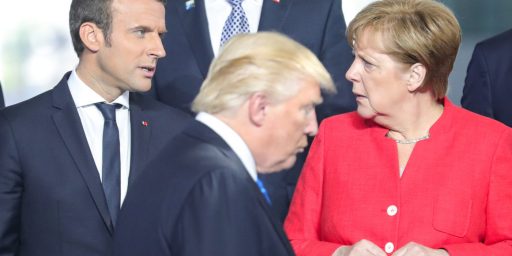NATO Summit
DefenseLINK News: U.S., European Officials Work to Strengthen Bridges
A year ago, the United States stood against NATO allies France and Germany in urging for the use of force against Iraq. Now, Iraq is liberated, and those countries are planning how best to guide the Iraqi people toward secure and prosperous self-government.
“The environment from this year’s meeting is fundamentally different from last year’s meeting,” a senior U.S. official said Feb. 6 about the emotional tone of the informal NATO defense ministerial meeting held here on the eve of the annual Munich Conference on Security Policy.
“We now have a NATO alliance that I think is trying very hard to overcome the divisions from the Iraq war,” said the official, who spoke on background.
***
German Defense Minister Peter Struck demonstrated this attitude publicly in remarks he made in a Feb. 6 press conference. Germany had been one of the most vocal critics of U.S.-led military action in Iraq.
Today he said the United States and Germany are on a good path of cooperation. “Problems we discussed a year ago here in Munich have been resolved today,” he said, through a translator.
“I don’t want to assert that all problems have disappeared in the trans- Atlantic relationship, because that’s not the case,” the U.S. official said. “But it is the case that U.S. relations with the great majority of European nations have always been good and continue to be good.”
Defense Secretary Donald Rumsfeld agreed. In a speech to the attendees at the Munich Conference Feb. 7, the secretary said he’s seen relationships among NATO countries ebb and flow over the years.
“I’m 71 years old, and I’ve watched NATO for a whale of a long time,” he said, describing the fluctuations as “the groans and creaks” of adjusting to a new security situation in the world.
“Last year was not unique in the history of this alliance. It’s been a pattern; it goes like this,” the secretary said, while moving his hand up and down as if describing ocean waves.
Rumsfeld also said he believes common values and goals will keep the relationship between the United States and other NATO allies strong.
“Any monkey looking down from Mars on Earth knows that the countries in NATO and North America are the bulk of the countries on the face of the Earth that have the same values, the same concerns, the same hopes and aspirations for the world, the same lack of a desire to impose their will on somebody else,” he explained. “We’re the bulk of the democracies in the world. We have common interests. And that is what the interest of the United States has been and is today.”
Agreed. It’s an old aphorism of international politics that nations have no permanent allies, only permanent interests. But the interests of the US and the rest of NATO are synonymous more often than not.





James Joyner wrote,
It’s true. But it’s awfully frustrating when a powerful minority of European democracies (i.e., France & Germany) are so blind to their own big-picture interests, and so intent on advancing their petty, venial ones in opposition to their and our long-term interests. That they do so through a fog of self-righteous superiority adds to the frustration.
I don’t suggest we pull out of NATO or willy-nilly sever our relationships with these countries. But, as Sec. Powell noted last year, there needs to be a price that they pay. If Americans choose not vacation there or to buy their products, that perturbs me not at all.
Boycotts were seductive initially–like last spring and summer, when I thought the only way to get through to the bureaucracies of France and Germany might be by having their business leaders sit them down for a heart-to-heart.
But at this point, whom are we hurting with boycotts?–mom and pop businesses. People who run little hotels and restaurants. Small vineyards. Shopkeepers.
I say it’s time to start buying again.
—